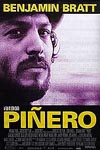Piñero (R) ★
 A biopic of the late Puerto Rican poet and playwright Miguel Piñero who turned his real life experiences at Sing-Sing prison into the Tony-Award winning play Short Eyes.
A biopic of the late Puerto Rican poet and playwright Miguel Piñero who turned his real life experiences at Sing-Sing prison into the Tony-Award winning play Short Eyes.
Story
Miguel Piñero died of cirrhosis in 1988 at the age of 40. He was a junkie, a drug dealer and a thief, but in Piñero, writer/director Leon Ichasco tries to paint a biased portrait of a saint. The film takes us through the various stages of Piñero's life (played by Benjamin Bratt), focusing on the making of his play Short Eyes, about a group of inmates whose lives are affected by the incarceration of a mild-mannered white man charged with child molestation. While the film showcases Piñero's talents (Short Eyes actually went on to play on Broadway, earn six Tony nominations and be made into a movie in 1976) and his accomplishments, including his co-founding of the Nuyorican Poets Cafe in Manhattan's Lower East Side, it actually reveals very little about Piñero himself. And what we do see is hardly endearing: Piñero and his friend Tito rip off drug dealers, kidnap a hooker and mug women in Times Square. Except for sporadic flashbacks that hint at child abuse and abandonment at the hands of his father, we do not know what makes Piñero tick. When friends ask him what has happened to the Miguel they once knew, he nonchalantly replies, ''It beez that way sometimes.''
Acting
In Piñero, Bratt (Miss Congeniality), trades in the handsome and chiseled character he portrays on the NBC series Law & Order for that of a drunk, greasy poet. Though it's a change of pace, Bratt's attempt to shed his conservative image almost seems forced here. He plays Piñero as called for in the script but doesn't bring much more to the performance. Talisa Soto (Mortal Kombat) plays his sometimes love interest Sugar, an aspiring actress from the projects. However, it is difficult to buy Soto, a former Sports Illustrated swimsuit model, as someone who cannot make it out of the ghetto. Joseph Papp, the director of New York's Public Theater, is played by Mandy Patinkin (Broadway's The Wild Party). Patinkin brings a bit of sincerity to a character that is portrayed as overly shrewd and cutthroat (Papp actually used income from commercial successes to support the production of works by lesser-known playwrights, directors and composers, including David Mamet and Sam Shepard). Look for the minor but lively character Cuqui (Al D. Rodriguez), a drag queen looking for a ride to stardom.
Direction
Ichasco's Piñero is a chronologically confusing and clumsily assembled collage of beatnik-inspired performance scenes. Shot on digital video, the film switches from color to black and white for no apparent reason other than to be ''artsy.'' The disturbing images that flash on screen during Bratt's rendition of selected poems--like of him receiving oral sex while being injected with heroine in both arms simultaneously to his voice-over of the poem Kill Kill Kill--only emphasizes the decadence and overindulgence that lead to Piñero's early death. The film also eludes any possible references to Piñero's homosexuality, portraying him as a strictly straight man by focusing on his relationship with Sugar, without ever addressing the rumors that Piñero was HIV-positive and may have died of AIDS. Nor does it delve into why Piñero rejected his own success (was it to in stay true to his roots?) ''I'm a writer/poet/reporter/thief/junkie,'' he brags. ''What do you do?'' As one observer in the film pointed out, anyone who lives like that could be a poet.
Bottom Line
Piñero's witty and penetrating work gets lost in the slanted and free-floating scenes that cover the New York Puerto Rican's 40 short-lived years. The end product is a narrow view of Piñero's life through the eyes of writer/director Ichasco.
To get the full Quicklook Films experience, uncheck "Enable on this Site" from Adblock Plus
box office top 10

Civil War Released: April 12, 2024 Cast: Kirsten Dunst, Wagner Moura 11.1M

Abigail Released: April 19, 2024 Cast: Melissa Barrera, Dan Stevens 10.2M

Godzilla x Kong: The New Empire Released: March 29, 2024 Cast: Rebecca Hall, Brian Tyree Henry 9.5M

The Ministry of Ungentlemanly Warfare Released: April 19, 2024 Cast: Henry Cavill, Eiza Gonzalez 9M

Spy x Family Code: White Released: April 19, 2024 Cast: Takuya Eguchi, Saori Hayami 4.9M

Kung Fu Panda 4 Released: March 8, 2024 Cast: Jack Black, Viola Davis 4.6M

Ghostbusters: Frozen Empire Released: March 22, 2024 Cast: Paul Rudd, Carrie Coon 4.4M

Dune: Part Two Released: March 1, 2024 Cast: Timothée Chalamet, Rebecca Ferguson 2.9M

Monkey Man Released: April 5, 2024 Cast: Dev Patel, Sikandar Kher 2.2M

The First Omen Released: April 5, 2024 Cast: Nell Tiger Free, Bill Nighy 1.7M






